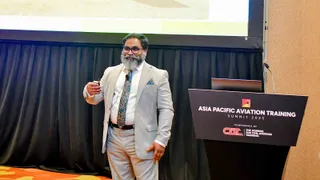Tech Leadership Insights: NVIDIA Founder and CEO Jensen Huang on AI
Contact Our Team
For more information about how Halldale can add value to your marketing and promotional campaigns or to discuss event exhibitor and sponsorship opportunities, contact our team to find out more
The Americas -
holly.foster@halldale.com
Rest of World -
jeremy@halldale.com
.jpg/r%5Bwidth%5D=320/f64cfc90-4e77-11ef-9dfc-b9c1a8ddadd1-Halldale%20Group%20Kauchak%20USN%20maintenance%20(1).webp)
Training organizations in defense , commercial aviation and adjacent safety critical industries are stepping up their exploratory activities to use AI to catapult their programs to higher levels of effectiveness.
A senior industry leadership insight on AI’s maturation for training and education – and more – was provided this July 29 when NVIDIA founder and CEO Jensen Huang was interviewed at SIGGRAPH 2024.
Huang discussed how accelerated computing and generative AI are transforming industries and creating new opportunities for innovation and growth. For brevity in this article, two select topics from the interview, the migration to “Software 3.0” and insights on how AI will assist employees in the performance of their jobs, are provided.
What was evident from this interview is that baseline AI is outpacing the ability of training enterprises’ to more fully use this learning enabler due to rules, laws, regulations, culture, ethics and other organizational aspects.
Ready for Software 3.0?
First a tech dive. Whereas humans have traditionally been in the loop for software programming, we now have machines that are learning to program the software, in fact, “writing software that no humans can, solving problems that we can barely manage before. Now, because we have generative AI, there is a new way of developing software,” Huang said.
The NVIDIA leader referred to software’s evolution by way of a model he attributed to Open AI co-founder Andrej Karpathy, who offered that software programming has advanced from its original way of being produced as Software 1.0, to machine learning in-the-loop (Software 2.0).
“And now we’re really moving to Software 3.0, because these generative AIs in the future, instead of using machine learning to learn a new AI for every researcher, will probably start with pre-trained foundation models that are already pre-trained.
The way that we develop software could very much be like assembling teams – with experts of various AI capabilities – some using tools, some able to generate special things, and then a general-purpose AI that is really good at reasoning that is connecting this network of AIs together – like team-solve problems. Software 3.0 is here!”
With that unilateral industry leader declaration, it is worth pondering whether training enterprises and their oversight organizations, be it commercial aviation regulatory agencies and even defense department acquisition agencies are ready to harmonize their rules, regulations, ways of doing business and other aspects, and embrace Software 3.0.
AI Assistants
Beyond software and acquisition is an issue with which organizations throughout safety critical communities – from defense to commercial aviation and industry – are grappling: the future role of humans in processes and enterprises.
While it is too early to declare the absolute end to humans on commercial aviation aircraft flight decks and even in all military jet aircraft, these and adjacent communities are increasingly opening the envelope on increased or absolute autonomy in aviation and defence, and in other domains.
Huang offered the delegates another attention getting statement: “It is very likely that all of our jobs are going to be changed,” and said, everybody will have an AI assistant.
He continued, “Every single company, every single job within the company will have AIs that are assistants to them.”
The corporate leader further noted: all NVIDIA software programmers have AIs that help them program; and all software engineers have AIs that help them debug software.
“We have AIs that help our chip designers design chips. Without AI, Hopper [superchip] and Blackwell [tensor core technology] would not have been possible…None of the work that we do would be possible anymore without generative AI.”
NVIDIA appears to have favorable tailwinds to propel its journey to evolve jobs across its enterprise. Concurrently commercial airlines and other industries are deliberately and incrementally introducing AI into their customer processes and other select “touch” points.
It is worth reflecting on when, how and even if, anytime soon, change can be brought about in rules and regulations, laws, culture and other organizational attributes to permit the wider-spread use of AI assistants and other job-changing technologies for aircraft maintenance personnel, on -the-floor technicians and other members of critical safety enterprises.
Halldale Group will be watching this journey at its events and commenting on them in our editorial departments.


